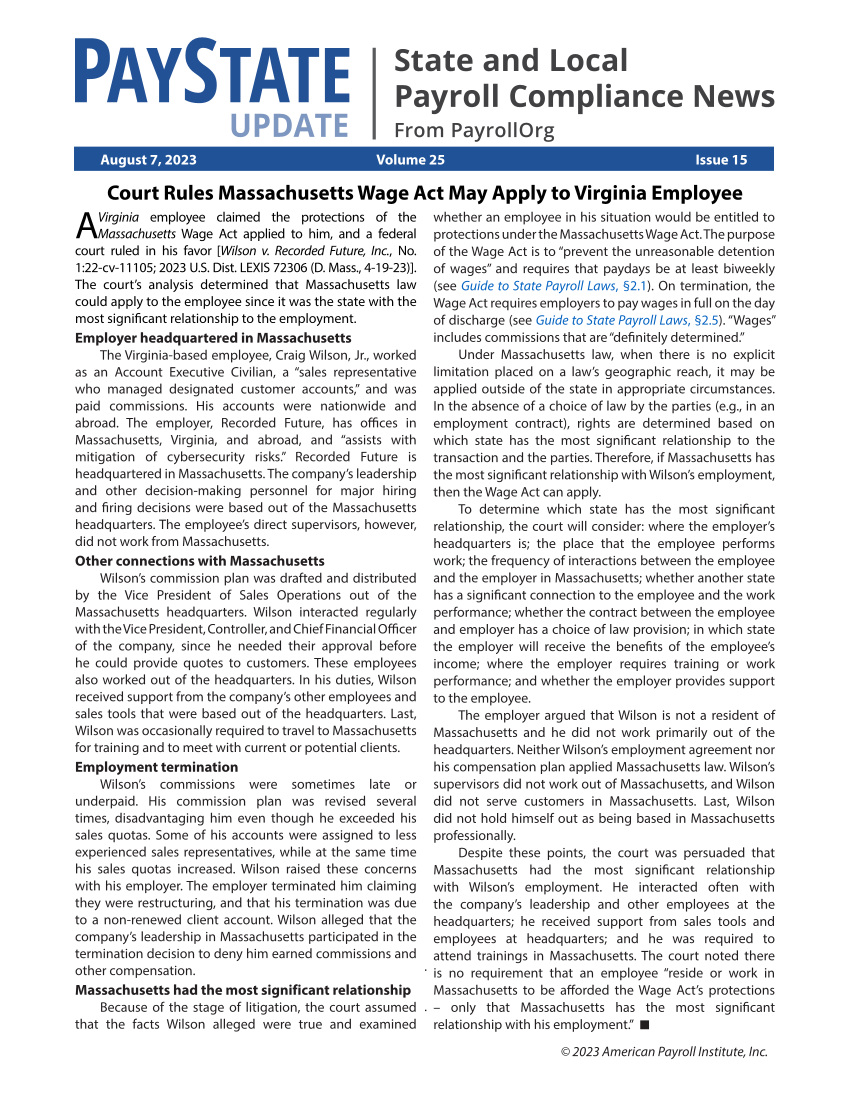© 2023 American Payroll Institute, Inc. Court Rules Massachusetts Wage Act May Apply to Virginia Employee A Virginia employee claimed the protections of the Massachusetts Wage Act applied to him, and a federal court ruled in his favor [Wilson v. Recorded Future, Inc., No. 1:22-cv-11105 2023 U.S. Dist. LEXIS 72306 (D. Mass., 4-19-23)]. The court’s analysis determined that Massachusetts law could apply to the employee since it was the state with the most significant relationship to the employment. Employer headquartered in Massachusetts The Virginia-based employee, Craig Wilson, Jr., worked as an Account Executive Civilian, a “sales representative who managed designated customer accounts,” and was paid commissions. His accounts were nationwide and abroad. The employer, Recorded Future, has offices in Massachusetts, Virginia, and abroad, and “assists with mitigation of cybersecurity risks.” Recorded Future is headquartered in Massachusetts. The company’s leadership and other decision-making personnel for major hiring and firing decisions were based out of the Massachusetts headquarters. The employee’s direct supervisors, however, did not work from Massachusetts. Other connections with Massachusetts Wilson’s commission plan was drafted and distributed by the Vice President of Sales Operations out of the Massachusetts headquarters. Wilson interacted regularly with the Vice President, Controller, and Chief Financial Officer of the company, since he needed their approval before he could provide quotes to customers. These employees also worked out of the headquarters. In his duties, Wilson received support from the company’s other employees and sales tools that were based out of the headquarters. Last, Wilson was occasionally required to travel to Massachusetts for training and to meet with current or potential clients. Employment termination Wilson’s commissions were sometimes late or underpaid. His commission plan was revised several times, disadvantaging him even though he exceeded his sales quotas. Some of his accounts were assigned to less experienced sales representatives, while at the same time his sales quotas increased. Wilson raised these concerns with his employer. The employer terminated him claiming they were restructuring, and that his termination was due to a non-renewed client account. Wilson alleged that the company’s leadership in Massachusetts participated in the termination decision to deny him earned commissions and other compensation. Massachusetts had the most significant relationship Because of the stage of litigation, the court assumed that the facts Wilson alleged were true and examined whether an employee in his situation would be entitled to protections under the Massachusetts Wage Act. The purpose of the Wage Act is to “prevent the unreasonable detention of wages” and requires that paydays be at least biweekly (see Guide to State Payroll Laws, §2.1). On termination, the Wage Act requires employers to pay wages in full on the day of discharge (see Guide to State Payroll Laws, §2.5). “Wages” includes commissions that are “definitely determined.” Under Massachusetts law, when there is no explicit limitation placed on a law’s geographic reach, it may be applied outside of the state in appropriate circumstances. In the absence of a choice of law by the parties (e.g., in an employment contract), rights are determined based on which state has the most significant relationship to the transaction and the parties. Therefore, if Massachusetts has the most significant relationship with Wilson’s employment, then the Wage Act can apply. To determine which state has the most significant relationship, the court will consider: where the employer’s headquarters is the place that the employee performs work the frequency of interactions between the employee and the employer in Massachusetts whether another state has a significant connection to the employee and the work performance whether the contract between the employee and employer has a choice of law provision in which state the employer will receive the benefits of the employee’s income where the employer requires training or work performance and whether the employer provides support to the employee. The employer argued that Wilson is not a resident of Massachusetts and he did not work primarily out of the headquarters. Neither Wilson’s employment agreement nor his compensation plan applied Massachusetts law. Wilson’s supervisors did not work out of Massachusetts, and Wilson did not serve customers in Massachusetts. Last, Wilson did not hold himself out as being based in Massachusetts professionally. Despite these points, the court was persuaded that Massachusetts had the most significant relationship with Wilson’s employment. He interacted often with the company’s leadership and other employees at the headquarters he received support from sales tools and employees at headquarters and he was required to attend trainings in Massachusetts. The court noted there is no requirement that an employee “reside or work in Massachusetts to be afforded the Wage Act’s protections – only that Massachusetts has the most significant relationship with his employment.” August 7, 2023 Volume 25 Issue 15
Printed for: PayrollOrg Bookshelf © 2024 American Payroll Institute, Inc. All Rights reserved. From: PayrollOrg Digital Publications (bookshelf.payroll.org)






